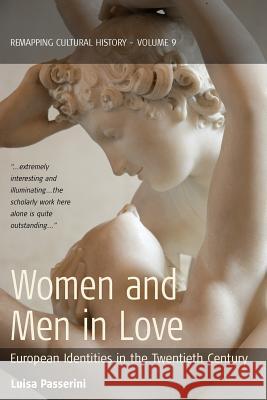Women and Men in Love: European Identities in the Twentieth Century » książka
Women and Men in Love: European Identities in the Twentieth Century
ISBN-13: 9780857451767 / Angielski / Miękka / 2012 / 392 str.
Women and Men in Love: European Identities in the Twentieth Century
ISBN-13: 9780857451767 / Angielski / Miękka / 2012 / 392 str.
(netto: 148,42 VAT: 5%)
Najniższa cena z 30 dni: 140,79
ok. 22 dni roboczych.
Darmowa dostawa!
...a rich, highly original, and innovative piece of work which curiously achieves a new way of understanding and analyzing trends in European history... Passerini has produced a book which will be of interest to a wide range of historians interested in culture, literature, society, and gender as well as in the history of emotions. Canadian Journal of History/Annales canadiennes d'histoire The stories as told by the author] are extremely interesting and illuminating, covering a quite extraordinary range of material (the scholarly work here alone is quite outstanding) from opera to publishing history to letters to film and fiction as well as archives... There are lots of interesting reflections on, for example, Orientalism and Islam, as well as politics, which provide food for thought in today's world...The volume is very well written and extremely clear, and the footnotes are often as important as the main text. John Foot, University College London It has often been assumed that Europeans invented and had the exclusive monopoly over courtly and romantic love, commonly considered to be the highest form of relations between men and women. This view was particularly prevalent between 1770 and the mid-twentieth century, but was challenged in the 1960s when romantic love came to be seen as a universal sentiment that can be found in all cultures in the world. However, there remains the historical problem that the Europeans used this concept of love as a fundamental part of their self-image over a long period (traces of it still remain) and it became very much caught up in the concept of marriage. This book challenges the underlying Eurocentrism of this notion while exploring in a more general sense the connection between identity and emotions. Luisa Passerini was Professor of Cultural History at the University of Turin, and is currently External Professor at the European University Institute, Florence, and Visiting Professor in the Oral History Master Program, Columbia University, New York. She has published widely on the historical relationships between the discourse on Europe and the discourses on love, gender and generation, and on memory and subjectivity. She was coeditor of Women Migrants from East to West: Gender, Mobility and Belonging in Contemporary Europe (Berghahn Books 2007).
...a rich, highly original, and innovative piece of work which curiously achieves a new way of understanding and analyzing trends in European history... Passerini has produced a book which will be of interest to a wide range of historians interested in culture, literature, society, and gender as well as in the history of emotions. Canadian Journal of History/Annales canadiennes dhistoireThe stories [as told by the author] are extremely interesting and illuminating, covering a quite extraordinary range of material (the scholarly work here alone is quite outstanding) from opera to publishing history to letters to film and fiction as well as archives... There are lots of interesting reflections on, for example, Orientalism and Islam, as well as politics, which provide food for thought in todays world...The volume is very well written and extremely clear, and the footnotes are often as important as the main text. John Foot, University College LondonIt has often been assumed that Europeans invented and had the exclusive monopoly over courtly and romantic love, commonly considered to be the highest form of relations between men and women. This view was particularly prevalent between 1770 and the mid-twentieth century, but was challenged in the 1960s when romantic love came to be seen as a universal sentiment that can be found in all cultures in the world. However, there remains the historical problem that the Europeans used this concept of love as a fundamental part of their self-image over a long period (traces of it still remain) and it became very much caught up in the concept of marriage. This book challenges the underlying Eurocentrism of this notion while exploring in a more general sense the connection between identity and emotions.Luisa Passerini was Professor of Cultural History at the University of Turin, and is currently External Professor at the European University Institute, Florence, and Visiting Professor in the Oral History Master Program, Columbia University, New York. She has published widely on the historical relationships between the discourse on Europe and the discourses on love, gender and generation, and on memory and subjectivity. She was coeditor of Women Migrants from East to West: Gender, Mobility and Belonging in Contemporary Europe (Berghahn Books 2007).











